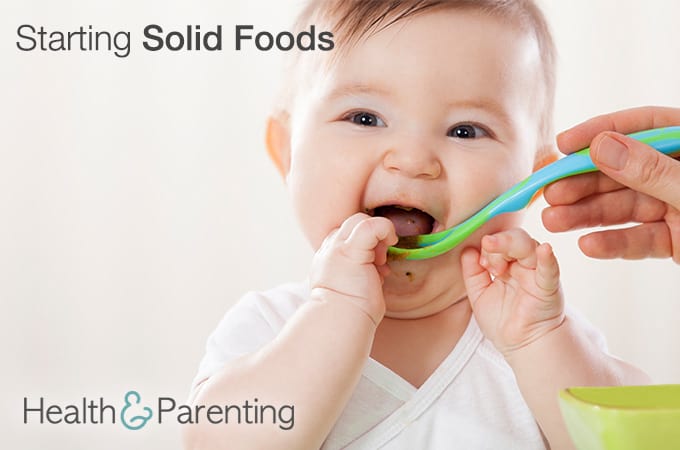According to experts, breastmilk is all your baby needs for the first six months of life. From age 6 months to age 12 months, solids should be an experiment in taste and texture, while breastmilk remains the main source of baby’s calories.
Is my baby ready for solids?
You baby may be ready for solids if:
- He can sit on his own
- He has lost the tongue thrust reflex (he doesn’t immediately push food out of his mouth with his tongue)
- He has developed the “pincer grasp” (the ability to pick up small object with his thumb and forefinger)
- He is no longer satisfied even with more frequent breastfeeding
You may notice that your baby watches food move from your plate to your mouth, and he may reach for food anytime you have a meal or snack. You might even see him making chewing motions in imitation of you eating!
Many healthcare providers recommend starting with baby cereal and moving on to fruits and vegetables, then finally adding meat. But, there’s no reason to go in this order, especially if your baby is 6 months or older when starting solids.
When you start solids, offer them one or two times a day, while continuing to breastfeed on demand. Nurse your baby before feeding solids so that you can keep up your milk supply. You can slowly increase the amount of solids your baby gets over the next few months, but breastfeeding should still remain the main source of nourishment.
Feed only one type of food for several days, watching for any type of allergic reaction. If baby does fine with that food, add another. If your baby refuses the foods you’re trying to feed him, consider finger foods instead. If he’s still not interested, wait a week or so and try again.
Does my baby need water?
Exclusively breastfed babies don’t need extra water, even when it’s hot outside. Once your baby is no longer exclusively breastfeeding, though, you may want to give him a few sips of expressed breastmilk or water with solids to keep his digestive system working well. Most babies who continue to breastfeed on demand while solids are being introduced do not need extra fluids.
When can I start a sippy cup?
Around age 6 months, you can start teaching baby to use a cup. Give only few sips of water a couple of times a day (no more than 2 ounces in 24 hours). Don’t expect him to gulp down full glasses of fluids, or to be very neat about it. It’s mainly an experience in learning how to manipulate a cup. Sometimes older babies and toddlers prefer a straw to a cup. Many babies aren’t interested in a cup until closer to 12 months old.
Written by Michelle, childbirth instructor, lactation consultant, and mother to 4 busy kids
This information is not intended to replace the advice of a trained medical doctor. Health & Parenting Ltd disclaims any liability for the decisions you make based on this information, which is provided to you on a general information basis only and not as a substitute for personalized medical advice. All contents copyright © Health & Parenting Ltd 2016. All rights reserved.










